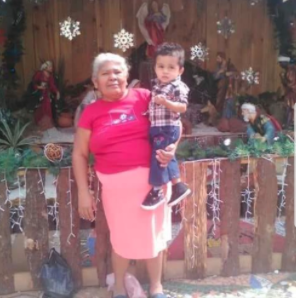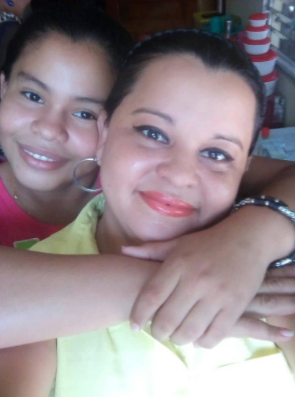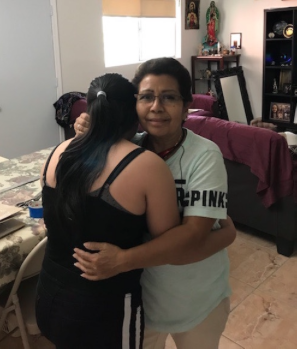Advocates Want to Know Why ICE Hasn’t Reunited These Separated Families
Advocates told Rewire.News that some of these children remain purposely separated from the adults they migrated with because they are legal guardians, not "parents."
![[Photo: Central American asylum seekers wait as U.S. Border Patrol agents take them into custody on June 12, 2018 near McAllen, Texas.]](https://rewirenewsgroup.com/wp-content/uploads/2018/08/GettyImages-975078484-800x533.jpg)
Immigration officials deported 54-year-old “Grandma Rosy,” as she’s being called by advocates, on August 16 after separating her from her 12-year-old granddaughter “Cindy” (a pseudonym) on May 7.
Rosy, whose name is withheld for safety reasons, and her granddaughter were fleeing gang violence in El Salvador. The grandmother’s own daughter was disappeared by local gangs and presumed killed, her attorney told Rewire.News. Rosy searched for her daughter for months, to no avail. This is how Rosy came to be Cindy’s legal guardian. But when gangs began recruiting Cindy to run errands for them and be a lookout during drug deals, Rosy knew it was time to leave.
“They threatened Cindy’s life. They pointed a gun at her and threatened to harm her. They said they were going to take Cindy from Rosy. They demanded money. Rosy went to the police, but they didn’t do anything,” her attorney, Lizbeth Mateo, told Rewire.News. “The police actually told Rosy that if she didn’t pay, she would end up killed. She had no choice but to leave. She told me that she already lost one child and she wasn’t going to lose another.”
Mateo said that her deportation was unlawful “on multiple levels.”
Immigration and Customs Enforcement (ICE) repeatedly asked Rosy to give up the legal rights to her granddaughter while she was in detention, Mateo said, which suggests that ICE knew she had rights over her granddaughter and that she should have been protected by a recent preliminary injunction. Issued by a California judge, the injunction required the government to reunite parents with their children by July 26, and ordered the government to stop deporting parents without their children unless the parent “affirmatively, knowingly, and voluntarily” agreed to be deported alone.
“She refused to sign her rights away and ICE kept trying, every couple of weeks they would ask her the same thing,” Mateo told Rewire.News in a phone interview prior to Rosy’s deportation. “How can someone like Rosy not qualify for reunification and be told they’re not the parent, and then get pressured to sign away their rights to their child?”
According to court documents filed last week, more than 500 children remain in federal custody after being subjected to President Trump’s “zero-tolerance” policy at the border. Advocates told Rewire.News that some of these children remain purposely separated from adults they migrated with because of the Trump administration’s narrow definition of “family.” Based on the cases advocates have encountered, the federal government appears to be prioritizing the reunification of biological parents with their children, not adults and children with other familial ties, even in cases when the adult has legal custody of the child. Ultimately, this has meant that family members who could be reunited in compliance with court rulings are being denied the opportunity to do so, according to advocates.
“The government is inventing so many excuses not to comply with the court order and this is another one—to say that someone does not qualify if they are not a biological parent, even if they have legal custody, even if their name is on birth certificate, as is the case for many people we’re working with who come from countries where the birth certificate is re-issued when someone obtains legal custody of a child,” said Bethany Carson, an immigration policy researcher and organizer at the Austin, Texas-based immigrant rights organization Grassroots Leadership. “It’s ludicrous these parents are being excluded from being released and reunited with children when they are the only parents the children have ever known.”
Rewire.News contacted ICE for comment regarding family reunification for children and legal guardians. A spokesperson for the agency said they were unable to comment because of “ongoing litigation.”
“Please Do Something”
Legal guardians whom immigration authorities have not recognized as parents continue to be subjected to separation, detention, and deportation, according to Carson, who has worked to publicize Rosy’s case, circulating a petition on her behalf. Her organization is working with other detained people with circumstances similar to Rosy’s.
This is happening to women like Leisby, who migrated to the United States from Honduras with her teenage sister, Mariela, and got swept up in the administration’s family separation policy. Leisby has legal custody of Mariela, whom she has raised since their mother died when Mariela was a young child. Mariela, who turned 15 in detention, is now living with a cousin she met in person for the first time upon being released from federal custody. Leisby remains detained.

Grassroots Leadership is also working with Marta, an 81-year-old great-grandmother who crossed multiple borders with her family to seek asylum in the United States. Marta migrated with her great-grandson Edras, who turned 5 while detained by the federal government. Subjected to the Trump administration’s family separation policy, everyone in the family has been released except for Marta, who ICE deemed ineligible for reunification with Edras, even though she is his legal guardian.
In recordings obtained by advocates and shared with Rewire.News, Leisby and Marta shed light on what it’s like to remain in federal immigration custody while separated from their children.
In one recording, Marta identified as a “battered woman” and explained that she has been transferred to five different detention facilities and has been treated “very badly.” Marta had previously been detained at the notorious T. Don Hutto Residential Center in Taylor, Texas, where she said the immigration officers “want to humiliate” the women detained there. Marta described other women she is detained alongside who are in similar circumstances, desperate to reunite with the children who were taken for them, and hoping for some kind of outside intervention from the public.
“With all my heart, I am [asking that you] have mercy on me, take me out of this place,” she said. “Please … do something, so that I leave this place to reunite with my family.”
“[S]ince they took my child I have not seen him again,” said Marta, who is currently detained at the South Texas Detention Complex. “We are not criminals; we are poor people who have come looking for a better future for our children.”
Marta said in the recording that she wants her great-grandson, Edras, to know she loves him, she misses him, and that she always holds him in her heart.

In another recording, Leisby said that what she needs most is to reunite with her sister, who “is like a daughter,” she said.
“Since my mom died, since she was little, she calls me ‘mom,’” Leisby said in the recording. The Honduran asylum seeker, who is detained at the Port Isabel Service Detention Center in Los Fresnos, Texas, said the only time she does not feel the pain of family separation is when her little sister calls her “mommy” because it gives her “more strength to go ahead and fight for her.”
“For me, she is my daughter not my sister. She calls me mommy … because God took [our mother] and [now] she has me as a mother,” Leisby said. “That is my wish to be with her again because I need her, we both need each other, and we cannot be separated.”
Generally, under previous administrations, families that migrated together were detained together or released with a notice to appear in immigration court, according to the Migration Policy Institute. Now, Carson said, the federal government is “looking for any excuse” to limit the class of people to whom the recent court order applies.
Neither the American Civil Liberties Union (ACLU) nor the Trump administration has released figures on the number of legal guardians or non-biological parents who remain detained or who have been deported after being deemed ineligible for family reunification. The ACLU told Rewire.News they have no stats on these families. Carson said that based on the cases she’s seen and the sources she is in contact with, she estimates that at least 200 of the children who remain in federal custody continue to be detained because the family member they migrated with is not their biological parent.
“We’re trying to see what can be done for these families. We’re going to fight for them because it’s clear they should have qualified for family reunification under the California court decision. All of these families were separated under the zero tolerance policy and there is no good reason they shouldn’t be released from detention and reunited with their children. The government separated these families, and they have an obligation to reunite them,” Carson said.
Rushed Through the Process
Rosy and Cindy presented themselves at a port of entry in Laredo, Texas, on May 6 and, by May 7, they had been separated. Cindy was sent nearly 2,000 miles away to New York, and for more than a week Rosy didn’t know where Cindy was, Mateo told Rewire.News. Rosy’s sister, a U.S. citizen, lived in Texas and attempted to get both of them released from federal custody. She was able to become Cindy’s sponsor on June 29, but Rosy remained detained until her deportation last week.

Like many distraught asylum seekers subjected to the “zero-tolerance policy,” Rosy was rushed through the asylum process while detained, and did not pass her credible fear interview. (Twenty-nine parents who were reunited with their children, but issued final deportation orders after failing their initial asylum interviews, are currently suing the Trump administration.)
“Her credible fear interview took place on June 7. She’d been separated from her granddaughter and detained for a month. She was incredibly stressed out and worried about Cindy. But she also had very major legal issues,” said Mateo, who became the fourth attorney to represent Rosy in under three months.
The first attorney didn’t bother to prepare Rosy for the credible fear interview or explain what the process was, according to Mateo. He also didn’t show up to her interview. The asylum officer doing the interview told Rosy to “keep the answers short” and told her not to “explain anything too much,” Mateo told Rewire.News. When Rosy failed her credible fear interview, her sister hired another attorney to help with the appeal process. The second attorney failed to appear at the hearing for the appeal, but sent a third attorney in their place. Rosy had never met the attorney, and the attorney did not appear to know the basics of her asylum claim, according to Mateo. Court transcripts also showed that not everything that occurred during the hearing was interpreted at all, Mateo said. There were instances in which the judge was talking to Rosy’s attorney, but the discussion wasn’t translated for Rosy.
When Mateo took over the case, she requested a new credible fear interview for Rosy and that request was still pending when Rosy was deported. Prior to the deportation, Mateo had also provided evidence that Rosy had been granted legal guardianship of her granddaughter in El Salvador to everyone she could think of—Rosy’s deportation officer, the asylum officer who conducted Rosy’s credible fear interview, and attorneys with the U.S. Department of Justice.
“I did everything I could to help the federal government recognize that Rosy was Cindy’s grandmother, she was the legal guardian of Cindy, and she had full custody of Cindy. That meant she should have been reunited with her, not in detention fighting for her survival,” Mateo said.
Rosy spent three months in detention.
Prior to Rosy’s deportation, the federal government attempted to deport her multiple times, despite court rulings that should have affected her case.
On August 9, a federal judge halted the deportations of asylum seekers fleeing domestic violence and gang brutality after the ACLU challenged the policy implemented by Attorney General Jeff Sessions. During the same hearing, the ACLU revealed that the federal government had attempted to deport an asylum seeker and her young child, but was forced by the court to turn the plane around and bring the pair back to the United States.
A few hours before the judge’s decision, something similar happened to Grandma Rosy, according to Mateo. The timeline is murky because Rosy was not able to communicate with Mateo when the deportation attempt happened, and ICE stopped responding to the attorney’s queries. What is known is that around 4:00 a.m. on August 9, Rosy’s sister called Mateo to tell her that Rosy had been deported, in violation of the federal injunction. A few hours later, Mateo received a text from Rosy’s sister saying that Rosy actually hadn’t been deported; she was removed from the plane headed to El Salvador and sent back to a detention center. Rosy’s deportation officer had no answers at the time for Mateo, saying only that the agency’s legal team was “reviewing the case.”
Now, Rosy’s only recourse for returning to the United States—and it’s a long shot—is suing the federal government, according to Mateo. But in the immediate days after her deportation, there are more pressing concerns, like Grandma Rosy’s safety.
“She is a single woman in a country without any protection. She is both the mother and the grandmother of young women who have been targeted because of their gender, their age, and their refusal to join gangs. At the very least, Rosy should have been granted the opportunity to fully present her case for asylum. My main concern is Rosy’s safety. She has already had a daughter disappeared,” Mateo said.
Currently, Grassroots Leadership is petitioning ICE and U.S. Citizenship and Immigration Services (USCIS), demanding that ICE release and reunite families like Marta’s, Leisby’s, and Grandma Rosy’s. In some cases where legal guardians remain detained, children have been released to family sponsors. In others, there were no family members in the United States to be sponsors, so the children remain detained.
Grassroots Leadership is also asking USCIS to allow asylum seekers subjected to the “zero-tolerance policy” to have another chance at their credible fear interviews. Many had just been separated from their children and were “frantic,” Carson told Rewire.News. “The trauma made them unable to function during the interview.” Like Grandma Rosy, many asylum seekers also report they were cut off by asylum officers or rushed through the process because of how many people were being processed through the system after the launch of the “zero-tolerance policy.”
Mateo told Rewire.News she believes that the Trump administration is very intentionally defining “family” to exclude sisters, aunts, grandmothers, and other immediate family members.
“Their main objective is to deport as many people as possible and to deny as many asylum claims as possible,” Mateo said. “That was clearly the plan of Sessions [when he limited asylum claims]. If they define ‘family’ more broadly, it defeats their purpose. All of what we’re seeing is just a tactic to accomplish their larger goal, which is to end immigration entirely for certain people.”
This is a developing story. Rewire.News will continue to report as more information emerges.
CORRECTION: A previous version of this article said Marta and Leisby were at Hutto, but they have moved to the South Texas Detention Complex and the Port Isabel Service Detention Center, respectively.
